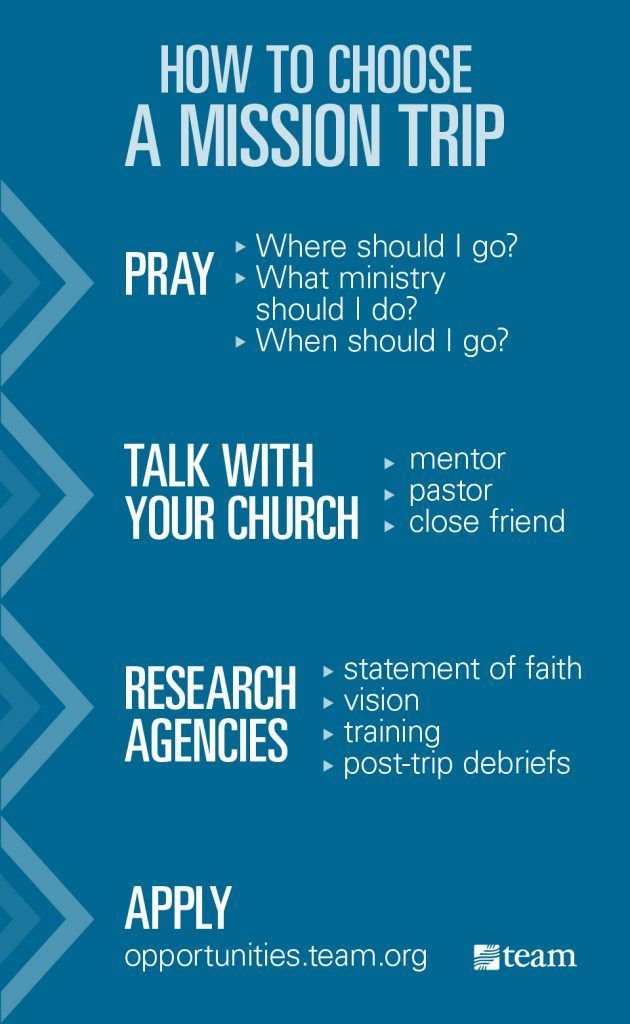A new interest in missions is often accompanied with an urgent desire to just go. But choosing a mission trip isn’t always easy. Where will you go? To do what ministry? And when?
As you process through the thousands of opportunities available to you, here’s some practical advice on how to choose a mission trip.
Pray About Three Topics
It sounds like a Christian platitude, but really, the first thing you should do is pray.
Prayer can help you discern your direction, but more importantly, prayer centers you on God’s direction. Here are three prayer topics to pursue as you ask God to show you what he is already doing around the world.
1) Where should I go on my mission trip?
Famous missionary William Carey said, “To know the will of God, we need an open Bible and an open map.”
Wesley Mills, TEAM mobilization team leader, encourages potential missionaries to follow this advice literally by praying over a map. During this exercise, ask God to reveal a particular region, people group or religious group to pursue further in research and prayer.
2) What should I do on my mission trip?
Consider your talents, and ask God to show you how your skills can meet a need on the mission field. It might be helpful to make a list of your gifts and
browse service opportunities
that relate.
For example, maybe you have an education degree and could
teach English as a second language
. Or maybe you are skilled at leading children and would thrive as a summer camp volunteer.
3) When should I go on my mission trip?
Prayerfully consider your life stage and current commitments. Beyond trip dates, you will also need to budget time for preparation. Hannah Smith, manager of short-term ministries , says to expect to spend one to two hours per week on training and support raising.
Consult Wise Counsel
Your decision to pursue a mission trip is not an individual one. Throughout scripture, missionaries (short- and long-term) are commissioned and sent out by their churches (Acts 13:2-3).
Involve your church early in your missionary journey by seeking counsel from a trusted pastor, mentor or friend. In your meeting, communicate your motivation for going on a mission trip and outline your particular ministry interests. Your mentor will be able to affirm God’s leading in your life and also illuminate the challenges you may have not yet considered.
Ask your mentor if he or she could connect you with a mission trip opportunity through your local church or point you to a missions agency like TEAM .
For a list of questions you and your mentor can use in conversation, click here .
Do Your Research
If you pursue a mission trip outside your church, there are hundreds of missions agencies and thousands of opportunities to explore. Consider these four factors when researching your options.
1) Statement of Faith
A statement of faith articulates an organization’s Gospel convictions. Serving with a missions organization means you affirm their beliefs, so it’s critical to study what is included (or not included) in this document.
To help you make an evaluation, you might find it useful to compare your church’s statement of faith to the mission agency’s statement. You can read TEAM’s statement of faith
here
.
If you have concerns about a doctrinal belief, voice them to your pastor or mentor before moving forward with the missions agency.
2) Vision Statement
An organization’s vision statement will help you see how your short-term mission trip contributes to their long-term strategy.
TEAM’s vision
is to establish reproducing churches wherever the most people have the greatest need. Other organizations focus their work around serving certain regions or populations.
It’s important to evaluate an organization’s vision statement to confirm that you desire to work toward the same goal.
3) Preparation and Training
Different organizations will offer you various levels of preparation and training for your short-term mission trip. Look for an organization that will help you with logistical support, safety and security, and cultural awareness.
To support the tools your missions organization offers, here are a few resources TEAM recommends for short-term missionaries:
- How to Write an Awesome Support Letter
- The Essential Missions Trip Packing Guide
- 20 Questions to Help You Prepare for a Mission Trip
4) Post-Trip Debrief
After your mission trip, you will need to process your spiritual and cultural experiences to prayerfully consider, “Now what?” Ask potential missions agencies if they have a debriefing process in place to help you reflect on your trip. If they do not but would be willing to meet with you post-trip, you can use this debriefing journal as a guide for your conversation.
Make a Decision and Apply
Even after following the above steps, you still might feel uncertain you are choosing the right mission trip. Use the wisdom you have gathered, and just apply.
Maybe this step will lead you to a different, better-suited direction, or maybe you will be on a plane this year. No matter the outcome of your application, though, God receives glory as you reflect His desire for all nations to know and worship Him.





















